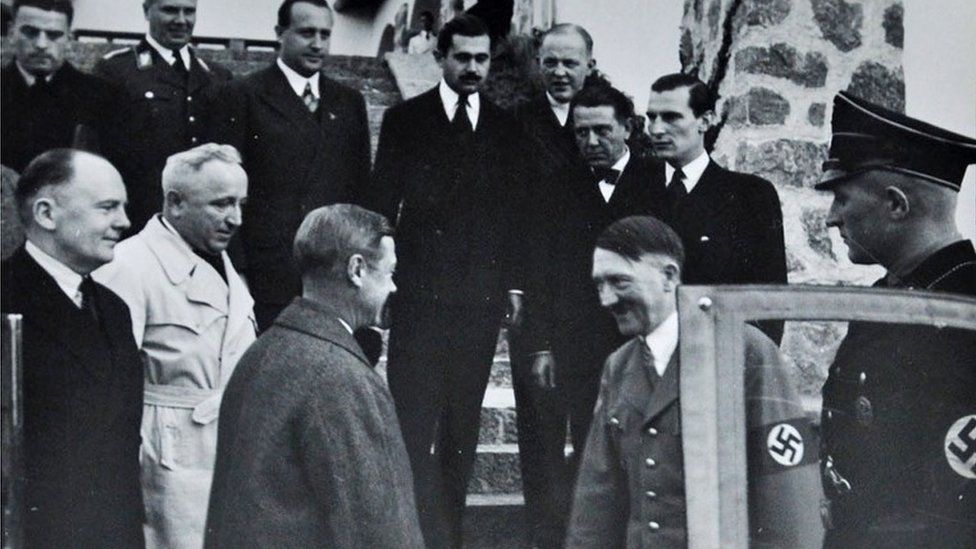When the Duke of Windsor met Adolf Hitler
- Published

The former King Edward VIII was welcomed by Adolf Hitler
Images of the Duke of Windsor meeting Adolf Hitler during a 1937 visit remain controversial. As 60 photos showing the duke and his new wife meeting the Nazi leadership sell at auction for £6,830, BBC News examines the story behind the pictures.
The unofficial royal visit to Germany caused much controversy and the former King Edward VIII has since faced numerous accusations of being a Nazi sympathiser.
However, royal historian Carolyn Harris said his motives were "peaceful" and linked to the acceptance of his new wife, the American divorcee Wallis Simpson, for whom he had abdicated as king in 1936.
She said the duke was "eager to carve out a new role for himself and ensure that his wife was treated as a full member of the Royal Family even though she had not received the title of Her Royal Highness - an issue that was of great concern to the duke".
King Edward VIII and Wallis Simpson
The trip was arranged so Wallis Simpson (seen here in a picture not part of the auction) could experience a state visit
The only British sovereign to abdicate voluntarily, Edward stepped down in 1936 so he could be allowed to marry the American divorcee Wallis Simpson
They married in June 1937 and were given the titles of Duke and Duchess of Windsor
For the next two years they lived mainly in France
After the outbreak of war, the duke was appointed governor of the Bahamas
He died of throat cancer in 1972 in Paris and was buried near Windsor
The duchess died in 1986 and was laid to rest alongside her husband
Source: BBC History
She added: "There was no precedent for an abdicated sovereign assuming an active public role on behalf of the current sovereign and the Duke of Windsor was frustrated that he appeared to be expected to live a quiet life in exile."
So the duke jumped at the chance to go to Germany when invited by its government, even though the British government did not support his decision and would have preferred the couple keep a low profile.
The Duke and Duchess of Windsor arrived at a railway station in Berlin where they were greeted by Nazi officials and a cheering crowd
His equerry Sir Dudley Forwood, who compiled the photo album, also said years later the unofficial trip was not a bid to support the Nazi regime, but instead to enable the duchess to experience a state visit.
Timothy Medhurst, of Duke's Auctions in Dorchester, Dorset, said the images showed the couple "in a relaxed environment being shown around by Nazis who are clearly proud of their nation".
"It is a unique piece of history compiled at a time when the Nazi war machine was preparing for European conquest and the systematic slaughter of millions of people," he added.
Royal historian Carolyn Harris said the duke's motives for visiting members of the Nazi regime were "peaceful"
Ms Harris, who specialises in European monarchy, said: "The Duke of Windsor was familiar with Germany - he had numerous relatives there - and seems to have envisioned a diplomatic role for himself as a mediator between Britain and Germany."
He shared the views of other senior figures in the British government "who thought a lasting peace could be negotiated through diplomacy", she said.
According to royal biographer Andrew Morton, he officially went there to look at housing conditions, an issue that he had been interested in when he was king.
"But the real reason was to show Wallis a good time and see exactly what it was like to enjoy a royal tour, and they were treated like royalty," he said.
"She was treated like a royal princess, not like the Royal Family treated her, like an outcast and an outsider.
"In Germany members of the aristocracy would bow and curtsy towards her, and she was treated with all the dignity and status that the duke always wanted."
Mr Morton added that despite being "thrilled" at the time, the couple later realised they had made a "ghastly mistake" after their actions upset American trade unions and Jewish organisations.
The trip did not mean the duke was a Nazi, he said.
"But he was certainly sympathetic... even after the war he thought Hitler was a good fellow and that he'd done a good job in Germany, and he was also anti-Semitic, before, during and after the war."
The equerry's invitation to the funeral of the Duchess of Windsor in 1986 was included in the album sale
Ms Harris told BBC News that in 1939, when war was imminent, the duke contacted Hitler "hoping to negotiate a peaceful solution, attempting to draw upon the rapport they developed during the 1937 visit".
However, she said his ties with Nazi Germany "made him a liability" for Britain during World War Two, which led to his appointment as Governor of the Bahamas "which removed him from Europe for the remainder of the war".
But Edward and Wallis "continued to cause anxiety for the British government" during their time in the Bahamas "as their visits to the United States attracted an enormous amount of public attention and the Duke of Windsor expressed pessimism about an English victory".
The auctioned photos show the duke meeting several Nazis during his trip
The duke and his wife visited many places, including a mine, a winter relief headquarters, a light bulb factory and a school
- Published27 January 2023
- Published20 July 2015
- Published18 July 2015
- Published22 January 2016
- Published13 November 2015
- Published16 October 2015
- Published4 June 2015
- Published21 January 2011